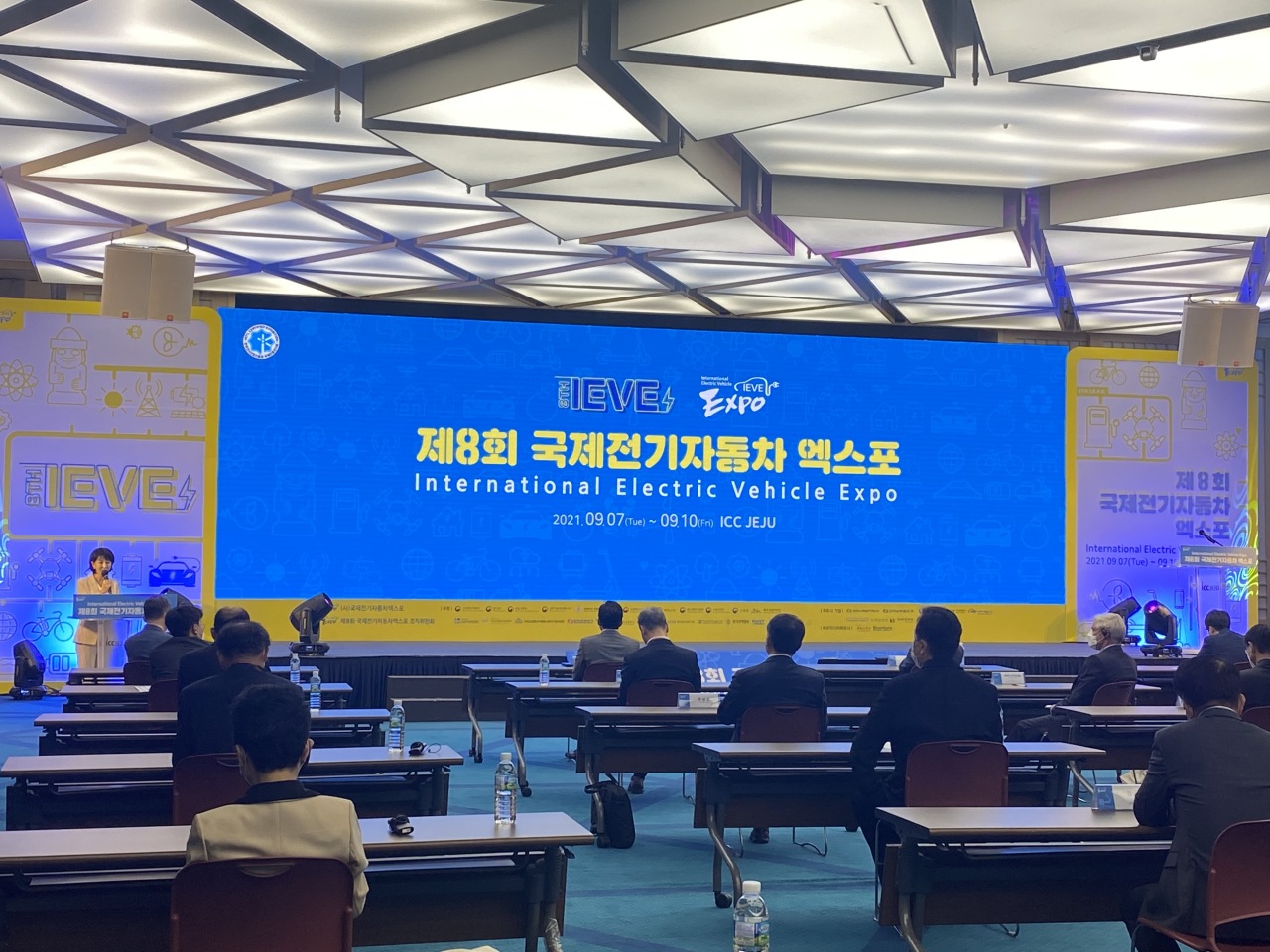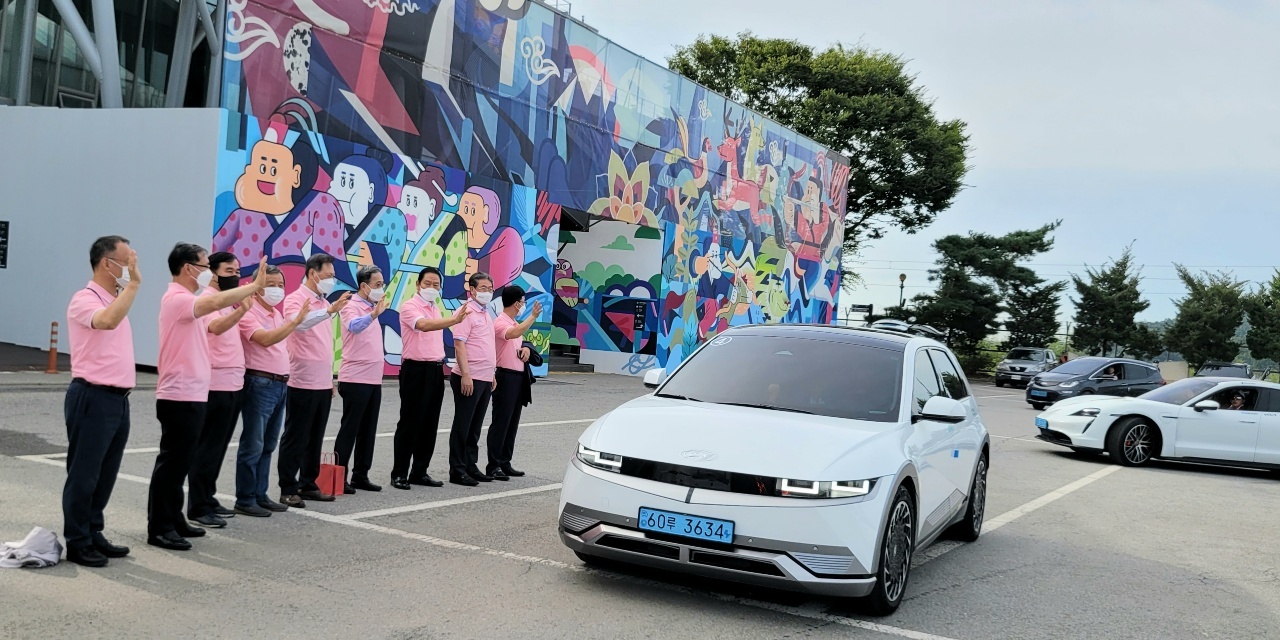 |
Opening ceremony of International Electric Vehicle Expo at the Jeju Convention Center in Jeju on Tuesday. (Jo He-rim/The Korea Herald) |
SEOGWIPO, Jeju Island -- Amid accelerating global efforts to go carbon-neutral, global automakers are pushing pure electric vehicles into the mainstream, to fundamentally change the face of mobility.
The 8th International Electric Vehicle Expo, which kicked off on Tuesday on the southern island of Jeju, seeks to expand the scope of e-mobility, shedding light on other means of transportation, including ships and urban air mobility.
“The goal of a carbon-free island cannot be done only with electric cars. So this year, we have organized the expo to introduce new faces,” Kim Dae-hwan, chief of the event’s organizing committee told reporters Tuesday, referring to Jeju Island’s ambition to go carbon-free.
In the opening ceremony, Shin Jai-won, the president of Hyundai Motor Group and chief of the company’s Urban Air Mobility division, highlighted the great potentials of urban air mobility as an efficient, safe and clean method of transportation amid rapidly progressing urbanization around the globe.
“The serious traffic congestion in cities should be considered as more than just a nuisance. It is actually creating economic and productivity losses, and there is no need to mention the safety issues,” Shin said.
“Combining the electrification and autonomous driving technologies, we expect to be able to develop a flight vehicle that is not only eco-friendly, but also more affordable and efficient.”
Former United Nations Secretary General Ban Ki-moon called on South Korean companies to step up and lead the transition to future mobility.
“For the goal of carbon neutrality, the role of business is as important as it is of the government, and Korean companies are stepping up efforts for the goal,” Ban said, giving examples of how the country’s leading car maker Hyundai Motor, and battery producers, SK Group, LG Group and Hanwha, are working to achieve the goals under the RE100 campaign to promote 100 percent usage of renewable energies.
Saying that he expects 57 percent of all passenger cars on the market and 30 percent of cars on road to be powered by electricity in 2040, Ban encouraged Korean automakers to keep up with global EV trends.
At this year’s expo, about 200 companies from 50 countries are participating, and some 100,000 people have been invited to attend, having access to some 50 conferences and sessions planned during the four-day event via livestream videos according to the expo organizers.
With the goal to expand the scope of e-mobility, two rounds of business workshops have been scheduled to discuss the current and future development of electricity-powered boats.
A round table talk on urban air mobility was also scheduled to take place on the second day of the expo.
Battery recycling and self-driving technologies for EVs are also among the topics planned for discussion during the expo sessions.
 |
An electric vehicle, participating in the first Korea Peninsula Peace Road Electric Vehicle Drive, departs from Imjingak Pyeonghwa Nuri Park in Paju, Gyeonggi Province, on Monday. (IEVE) |
Outside the expo, the first edition of the Korea Peninsula Peace Road Electric Vehicle Drive took place Tuesday, hosted by the Global EV Association Network and the user associations for Korea and Jeju.
The program, first agreed on in the third round of the GEAN plenary session in 2018, has been designed to promote peace and prosperity of the Korean Peninsula, and to raise awareness on possible cooperation of the two Koreas in the environment-friendly future mobility industry.
For the event, 30 electric vehicles departed on Monday from Imjingak Pyeonghwa Nuri Park in Paju, Gyeonggi Province -- located about 7 kilometers south of the cease-fire line -- to drive across the country and arrive at the Jeju Convention Center on Tuesday.
Upon arrival, owners of EVs, including Hyundai Motor’s Ioniq 5 and Tesla models, came to celebrate the event’s slogan, “EV One Belt, from Baekdu to Halla, and from Halla to Baekdu,” and expressed hopes for a real border-to-border drive in the future. Baekdu refers to the Baekdusan, the mountain on the North Korea-China border, and Halla refers to the Hallasan on Jeju Island.
Also on the sidelines of the event, Hyundai Motor is holding test-drives of its latest EV, Ioniq 5, and Nexo, the hydrogen fuel-cell compact sport utility vehicle, for participants.
South Korea’s southern resort island of Jeju has been considered as an ideal testbed market for EVs. The self-governing province plans to become a carbon-free island by 2030 with all vehicles on the island operating on electric batteries.
By Jo He-rim (
herim@heraldcorp.com)









